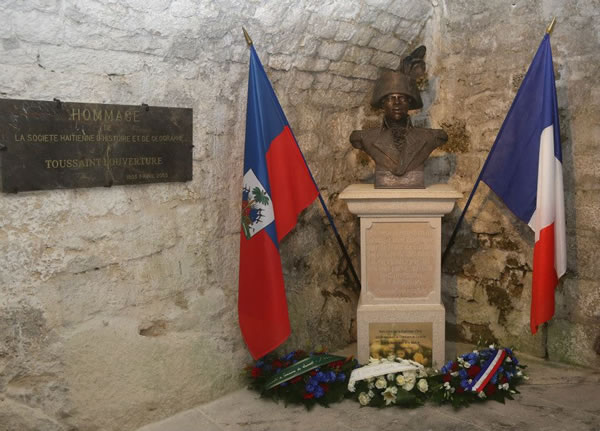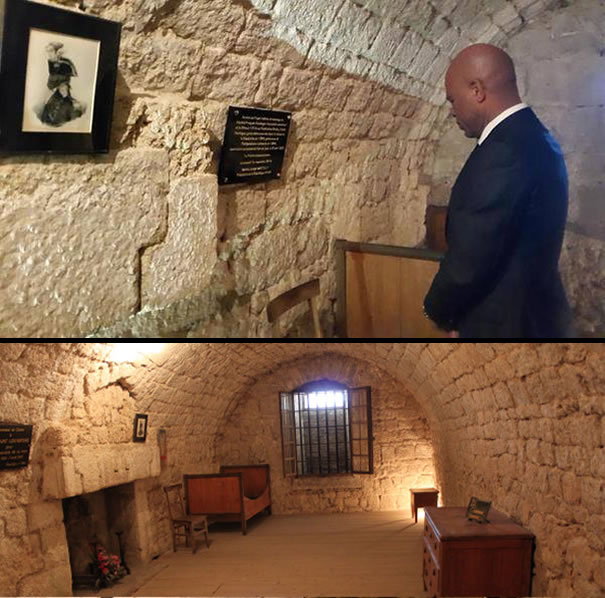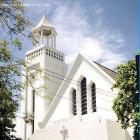ADVERTISEMENT
Fort de Joux
Fort de Joux in France in Honor of Toussaint Louverture with Haitian Flag
Here is a picture of Fort de Joux in France where Toussaint Louverture spent his list few years in prison under harsh condition. This day, it is another story all together. He is now considered a hero and both Haitians and French want to claim him.
Toussaint Louverture was known to his contemporaries as "the Black Napoleon". To abolish slavery from Haiti he fought against the best-trained European forces, including armies from France, England and Spain and France. He is the only successful revolutionary slave leader in modern history and the first Black to become the governor of a colony. He allied with France and became a dominant political and military leader in the French colony; ruled Saint Dominque as an independent state. When he drafted a constitution emphasizing abolition of slavery, he earned the ire of Napoleon Bonaparte. He was captured and on August 25, 1802, sentenced to a cold, isolated cell in the French mountain prison at Fort de Joux so that he would be forgotten from his countrymen behind his secluded prison. He died of pneumonia in his solitary cell within his seven months of captivity on April 7, 1803. He wrote a memoir during his confinement where he compared Napoleon's plan of forceful limiting him with phrases as--"cut out one's tongue and tell him to talk","bury a man alive". On October 29, 2014, the Haitian President Michel Martelly paid tribute before the statue of this Haitian independence hero at Fort de Joux in France and placed a Haitian flag in his honor.
Visit by Michel Martelly in Fort de Joux in France in Honor of Toussaint Louverture
Here is a picture of Haitian President Michel Martelly on October 29, 2014 as he stands in front od the statue of Toussaint Louverture in Fort de Joux in France in Honor of this great Haitian hero, known internationally
Toussaint Louverture was a self educated person and a former slave who rose to become the leader of the only successful slave uprising in modern history. He joined the slave insurgency and quickly with efficiency became the military secretary to Georges Biassou, one of the insurgency's leaders. When his leaderships allied itself with Spain against France, he followed. In 1794, when Spain and Britain threatened France to take control of the island, the French acted to preserve its colonial rule and to gain the loyalty of the black population, granted citizenships, rights and freedom to all blacks within the empire. L'Ouverture allied with France against Spain during 1794 to 1802, and became a dominant political and military leader in the French colony. By 1801, he ruled Saint Dominque as an independent state. He drafted a constitution emphasizing the abolition of slavery and appointed himself governor for "the rest of his glorious life. In 1802, Napoleon organized a large military expedition and dispatched his brother-in-law, Charles Leclerc, to capture L'Ouverture and return the island to slavery under French control. Toussaint was captured and was shipped to Fort de Joux for imprisonment. It was there where he died of pneumonia in a solitary cell on April 7, 1803. On Saturday, November 1, 2014, President Martelly paid tribute to this great to the independence hero, at Fort de Joux and at the initiative of the French authorities, he was invited to 'meditate' to the dungeon of Fort de Joux, where Toussaint Louverture died.
Toussaint Louverture's Statue With French and Haitian Flag at Fort de Joux
Here is a statue of the Haitian hero Toussaint Louverture standing proudly in Fort de Joux in France With French and Haitian Flag.
Francis Domenica Breda or Toussaint Louverture (1743-1803) as he was more popularly known, is one of the great leaders in the history of the Haitian revolution. He was born in a slave family and the first Black to become the governor of a colony. Toussaint was a self educated revolutionary who defeated Europe's best-trained forces, including armies from France, England and Spain and France. After securing its independence, Toussaint renamed St. Domingue as "Haiti" and his policy on abolition of slavery eventually aroused the ire of Napoleon Bonaparte. On June 7, 1802, He was captured in Saint Domingue by an act of deceit by a French General of Division named Jean Baptiste Brunet. Toussaint, who had never remained far from his warm sea-level Caribbean life, was transported to Fort de Joux in France by ship and sentenced to a cold solitary cell measuring 6,50 x 3,90 meters. He was one of the fort's most noted prisoner. He suffered from loneliness and died in the prison out of a certain malady of the lung. Today, the fort is a tourist site, tourists come to pay tribute to his statue at Fort de Joux gifted by Haiti to mark the bicentenary of his death. The statue has French and Haitian flags on both sides.
Michel Martelly, paid tribute at Fort de Joux - Toussaint Louverture
Here is a picture of the Haitian President Michel Martelly on October 31, 2014 in France as he was paying tribute at Fort de Joux to the Haitia Hero Toussaint Louverture.
Martelly Honors Memory of Louverture
President Martelly is the first Haitian head of state serving, who has ever visited the cell of General Toussaint Louverture at Fort de Joux, who died nine months before Haiti's liberation in January 1804.
Louverture has been honored with symbolic, commemorative, and institutional remembrances ever since his death.
President Martelly has called Louverture Haiti's "black Spartacus". First Lady Sophia described Louverture as ". . . one of the greatest humanists the world has ever known."





 Church Avenue Bakery Haitian Patties
Church Avenue Bakery Haitian Patties  François Nicolas Duvalier Potential Candidate for President of...
François Nicolas Duvalier Potential Candidate for President of...  Ernst 'ZeNono' Jean-Baptiste wants to replace Sepp Blatter as...
Ernst 'ZeNono' Jean-Baptiste wants to replace Sepp Blatter as...  Haitiano-Japanese Naomi Osaka wins the US Open against Serena...
Haitiano-Japanese Naomi Osaka wins the US Open against Serena...  Delimart Plaza, Delmas 32, Port-au-Prince, Haiti being looted
Delimart Plaza, Delmas 32, Port-au-Prince, Haiti being looted  Jean Henry Céant deposited documents in Parliament for...
Jean Henry Céant deposited documents in Parliament for...  Dr. Michaëlle Amédée Gédéon is dead
Dr. Michaëlle Amédée Gédéon is dead  Haiti Street Food, manje kwit or Chin Janbe, for $1 or less
Haiti Street Food, manje kwit or Chin Janbe, for $1 or less 



